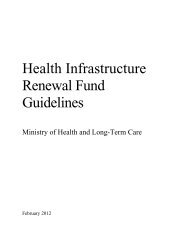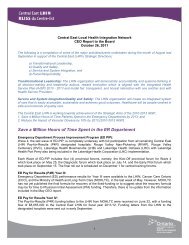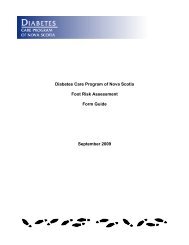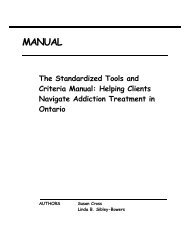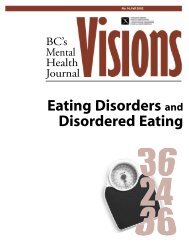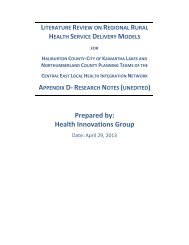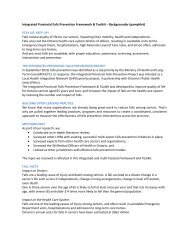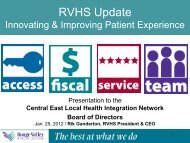CDE Appendix 1 Literature Review - Central East Local Health ...
CDE Appendix 1 Literature Review - Central East Local Health ...
CDE Appendix 1 Literature Review - Central East Local Health ...
You also want an ePaper? Increase the reach of your titles
YUMPU automatically turns print PDFs into web optimized ePapers that Google loves.
The Culture, Diversity and Equity Project: <strong>Literature</strong> <strong>Review</strong><br />
Box 4.10: A <strong>Health</strong> Equity Assessment Tool (Equity Lens) for Tackling Inequalities in <strong>Health</strong> –<br />
New Zealand Department of <strong>Health</strong><br />
The New Zealand Department of <strong>Health</strong> (2004) has developed a health equity impact self-assessment tool for the healthcare<br />
sector that consists of a series of questions to assist health authorities to ‘consider how particular inequalities in health have<br />
come about, and where the effective intervention points are to tackle them.’ These questions include:<br />
1. What health issue is the policy/programme trying to address?<br />
2. What inequalities exist in this health area?<br />
3. Who is most advantaged and how?<br />
4. How did the inequality occur? (What are the mechanisms by which this inequality was created, is maintained or increased?)<br />
5. What are the determinants of this inequality?<br />
6. How will you address the Treaty of Waitangi in the context of the New Zealand Public <strong>Health</strong> and Disability Act 2000?<br />
7. Where/how will you intervene to tackle this issue? Use the Ministry of <strong>Health</strong> Intervention Framework to guide your thinking.<br />
8. How could this intervention affect health inequalities?<br />
9. Who will benefit most?<br />
10. What might the unintended consequences be?<br />
11. What will you do to make sure it does reduce/eliminate inequalities?<br />
12. How will you know if inequalities have been reduced/eliminated?<br />
Source: Te Roopu Rangahau a Erü Pomare., Ministry of <strong>Health</strong> and Public <strong>Health</strong> Consultancy. 2003. A <strong>Health</strong> Equity<br />
Assessment Tool. Wellington: Public <strong>Health</strong> Consultancy, Wellington School of Medicne and <strong>Health</strong> Sciences. Adapted by<br />
Ministry of <strong>Health</strong> in May 2004 from Bro Taf Authority. 2000. Planning for Positive Impact: <strong>Health</strong> inequalities impact assessment<br />
tool. Cardiff: Bro Taf Authority<br />
There are also numerous diversity and cultural competence organizational self-assessment tools and diversity<br />
performance management frameworks (see for instance the LHINS Diversity Self-Assessment Tool developed by<br />
the GTA Diversity Group; Wilson-Stronks et al., 2008; Olavarria et al., 2005; Vancouver Ethnocultural Advisory<br />
Committee of the Ministry of Children and Families, 1998).<br />
There are nevertheless limitations to relying solely on self-assessment, particularly insofar as these rely upon<br />
organizations and staff being honest, objective, self-critical and comprehensive. Partly to counter criticisms of an<br />
over-reliance on self-assessment of previous performance evaluation systems in the UK, the <strong>Health</strong>care Commission<br />
(an independent healthcare inspection agency in England and Wales) has come to play an expanded role in<br />
reviewing healthcare provider progress toward national standards (including health inequality targets) (Exworthy et<br />
al., 2006).<br />
National and local health authorities in the UK are also subject to external assessments as part of the process of<br />
applying for the ‘Equality Mark’ – a government sanctioned validation award of ones excellence in meeting the<br />
Equality Standard for <strong>Local</strong> Government (ESLG), which includes a 5-level evaluation framework for progress on<br />
equality (see Improvement and Development Agency website at<br />
http://www.idea.gov.uk/idk/core/page.do?pageId=5145192).<br />
NHS London and other strategic health authorities also regularly commission independent research into the degree<br />
of compliance of London NHS organisations with various equality legislative acts and duties. Trusts within NHS<br />
London are also required to seek out feedback from their users, employees and partner organisations on their<br />
performance around equity and diversity issues to ensure that a gap does not exist and open up between their<br />
perception of the organization’s achievements and the reality.<br />
Client satisfaction surveys are particularly critical to enhancing public accountability and ensuring that strategic<br />
policy initiatives and interventions are achieving their intended results, from the perspective of service users.<br />
96



